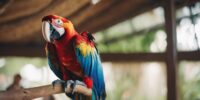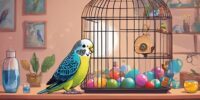When to Consider a Budgerigar as Your First Parrot
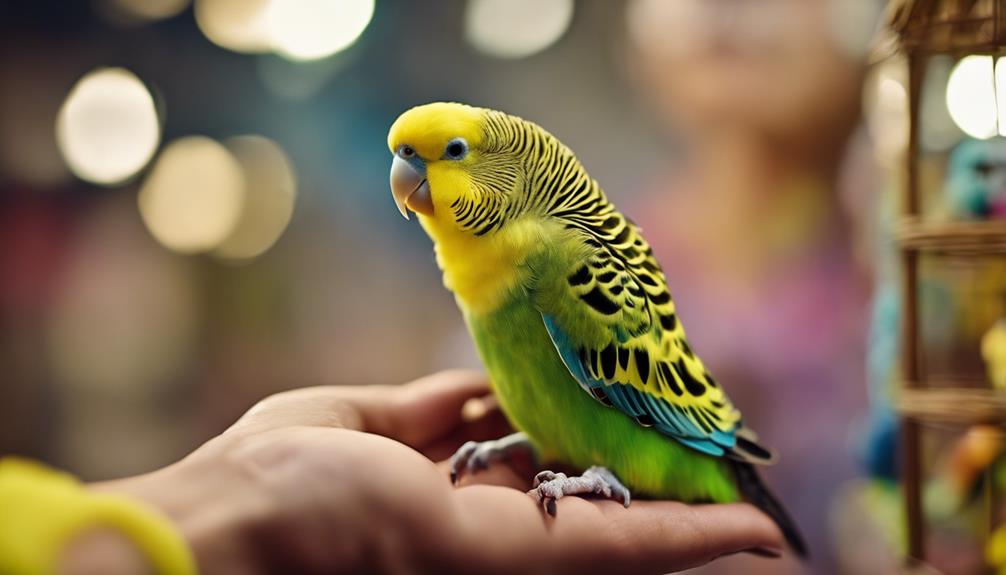
When considering Budgerigars as your first parrot, there are several important factors to keep in mind.
Firstly, Budgerigars, or budgies as they are commonly known, are charming and intelligent birds. They can be affectionate and playful companions, often forming strong bonds with their owners.
In terms of care requirements, Budgerigars need a spacious cage with plenty of room to fly and exercise. They also require a varied diet consisting of seeds, fruits, and vegetables to ensure they receive all the necessary nutrients.
Regular interaction and mental stimulation are essential for keeping Budgerigars happy and healthy. Spending time training, playing, and socializing with your budgie will help strengthen your bond and provide enrichment for your feathered friend.
Overall, Budgerigars can make wonderful first parrots for those willing to dedicate time and effort to their care and companionship.
Key Takeaways
- Budgerigars are charming, intelligent, and affordable for first-time parrot owners.
- They require social interaction, mental stimulation, and regular veterinary care.
- Financial planning is crucial for setup costs, ongoing expenses, and potential emergencies.
- Responsible ownership involves understanding budgerigar needs, budgeting for care, and providing attention.
Budgerigar Personality Traits
With their vibrant plumage and inquisitive demeanor, budgerigars, commonly known as budgies, exhibit a captivating blend of intelligence and sociability that distinguishes them as popular pet companions. These small parrots aren't only intelligent but also incredibly social creatures. Budgerigars thrive on interaction and enjoy forming strong bonds with their owners, making them ideal for first-time parrot owners seeking a companion that craves attention and companionship.
One of the most endearing traits of budgerigars is their playful nature. These birds are known for their curiosity and love for engaging in various activities, such as playing with toys and exploring their surroundings. Their lively demeanor and willingness to interact make them delightful pets that can bring joy and entertainment to any household. Additionally, budgies' ability to mimic sounds and even learn to talk adds a unique charm to their already charismatic personality, making them a favorite choice for those looking for a communicative and sociable feathered friend.
Budgerigar Care Requirements
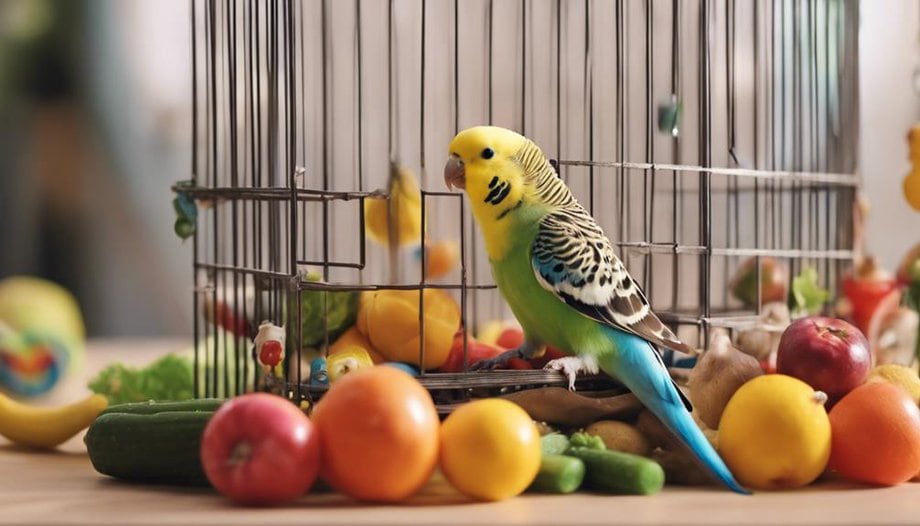
Budgerigar care requirements encompass crucial aspects like diet and nutrition, as well as cage setup and maintenance. Ensuring a balanced diet that includes seeds, pellets, fruits, and vegetables is vital for their well-being.
Additionally, providing a spacious cage with proper accessories promotes physical activity and mental stimulation for these intelligent birds.
Diet and Nutrition
Optimizing a budgerigar's health and well-being starts with providing a balanced diet rich in high-quality pellets, fresh produce, and essential nutrients. Along with a variety of seeds, fresh fruits, and vegetables, budgerigars benefit from calcium supplements like cuttlebones to support their bone health and beak maintenance.
It's crucial to steer clear of feeding them harmful foods such as avocado, chocolate, caffeine, or items high in salt, sugar, or fats, as these can jeopardize their well-being. To ensure your budgerigar remains in good shape, monitor its weight regularly and adjust its diet accordingly.
Cage Setup and Maintenance
To ensure optimal well-being for your budgerigar, proper cage setup and maintenance are essential components of their care requirements.
- Cage Size: The cage should be a minimum of 18x18x18 inches to allow ample room for your budgerigar to move around comfortably.
- Perches: Provide various perches of different sizes and materials to promote foot health and encourage exercise.
- Cleaning: Regularly clean the cage by removing droppings, changing bedding, and sanitizing with bird-safe cleaning products to maintain a hygienic environment.
- Toys Rotation: Rotate and replace toys frequently to prevent boredom and stimulate your budgerigar mentally.
Following these guidelines will help create a safe, engaging, and healthy living space for your budgerigar.
Budgerigar Training Considerations
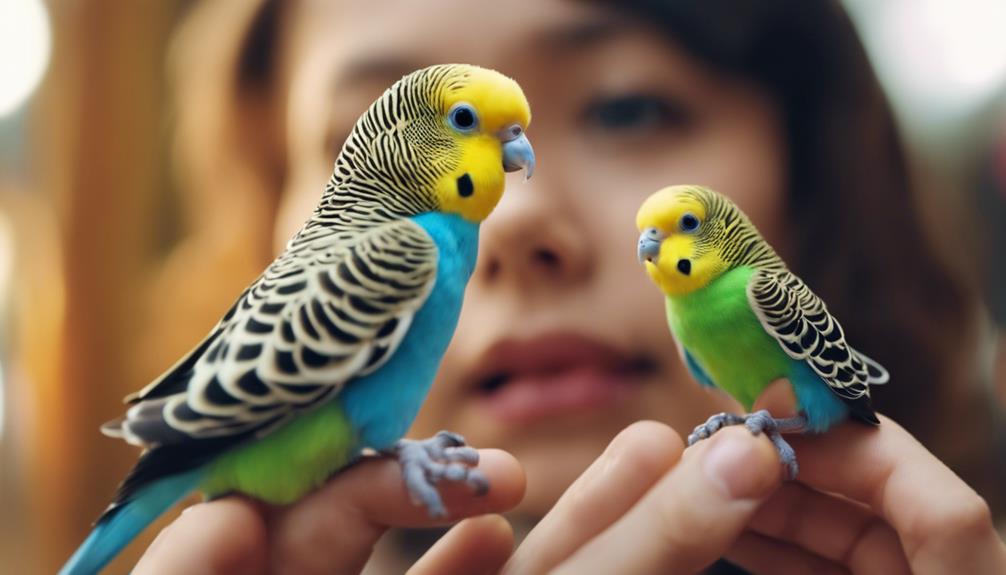
When considering budgerigar training, incorporating consistent positive reinforcement methods is crucial for successful results. These intelligent birds respond well to training when rewarded with treats and praise for desired behaviors. Patience and consistency are essential, as budgerigars may require time to grasp commands.
Teaching them to step up onto your finger, perform tricks, and mimic sounds can be achieved through proper training techniques. Keeping training sessions short and enjoyable helps prevent boredom and ensures the bird remains interested in learning new behaviors.
Budgerigar Socialization Needs
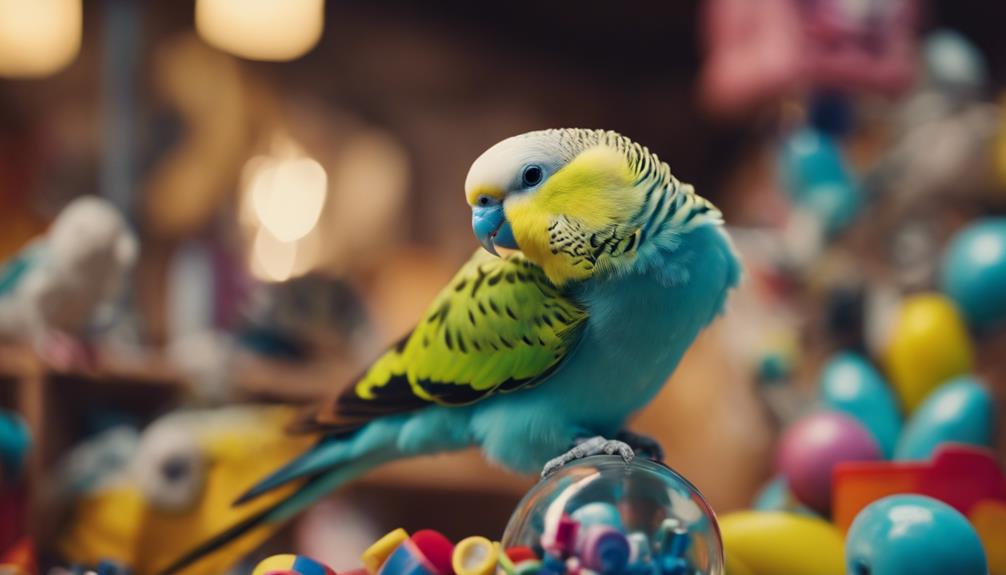
Transitioning from budgerigar training considerations, understanding the socialization needs of these highly interactive birds is essential for fostering a strong bond and ensuring their mental well-being. Budgerigars aren't solitary creatures; they require regular interaction and companionship to thrive.
Here are some key points to consider when addressing the socialization needs of budgerigars:
- Interaction: Regular and positive human interaction is crucial for budgerigars to feel secure and happy.
- Companionship: These birds form strong bonds with their owners, seeking companionship and attention for their well-being.
- Mental Stimulation: Engaging in enrichment activities like puzzle toys and foraging opportunities can keep budgerigars mentally sharp and prevent boredom.
- Bond: Spending quality time each day, incorporating training sessions and playtime, helps strengthen the bond between the budgerigar and its caregiver.
Budgerigar Space and Housing
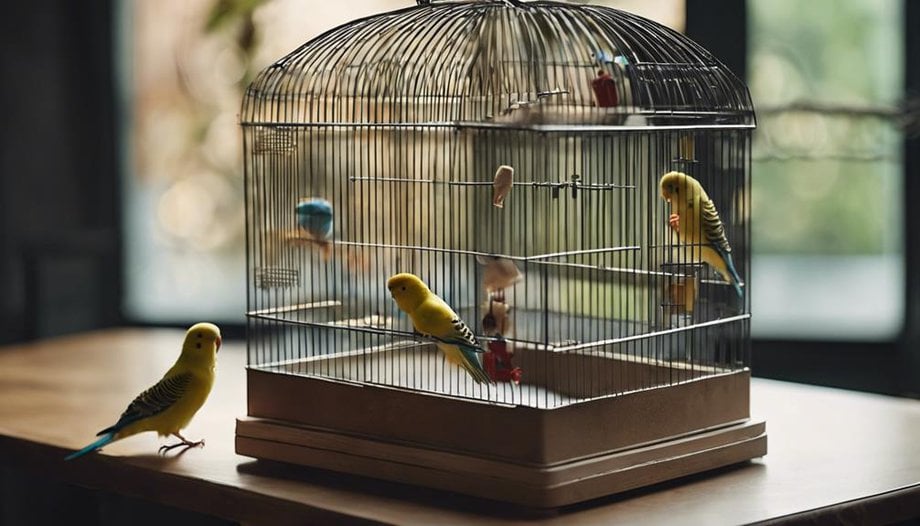
Budgerigars require a spacious cage with dimensions of at least 18x18x18 inches for single birds, ensuring they've room to move freely.
It's crucial to provide a variety of perches and toys within the cage to keep them mentally stimulated and physically active.
Consideration should also be given to offering a flight cage or aviary for budgies to exhibit natural behaviors and stretch their wings.
Cage Size Requirements
Optimizing the living space for budgerigars involves carefully selecting an appropriately sized cage that accommodates their need for movement and exercise. When considering cage size requirements for budgerigars, keep in mind the following:
- Minimum Cage Size: A cage measuring at least 18x18x18 inches is essential to provide ample space for budgerigars to move around comfortably.
- Exercise: Larger cages, like 24x24x24 inches, enable budgerigars to engage in natural behaviors such as flying and hopping.
- Bar Spacing: Ensure that the cage bars are spaced approximately 0.5 inches apart to prevent escapes or accidents.
- Accessories: Including horizontal bars, perches, toys, and feeding stations in the cage setup enhances both the mental and physical stimulation for your budgerigar.
Enrichment and Toys
To enhance a budgerigar's living environment, providing a diverse range of enrichment items and toys is essential for promoting physical and mental stimulation. A spacious cage with horizontal bars for climbing and flying is crucial.
Including various safe and engaging toys helps prevent boredom and stimulates mental activity. Different-sized perches with varying textures promote foot health and exercise. It's important to rotate toys regularly to keep your budgerigar mentally stimulated and engaged.
Additionally, creating a playground area outside the cage for supervised playtime and exploration can further enhance your budgerigar's quality of life. By incorporating these elements into their environment, you can ensure that your budgerigar remains active, healthy, and mentally enriched.
Budgerigar Health Considerations
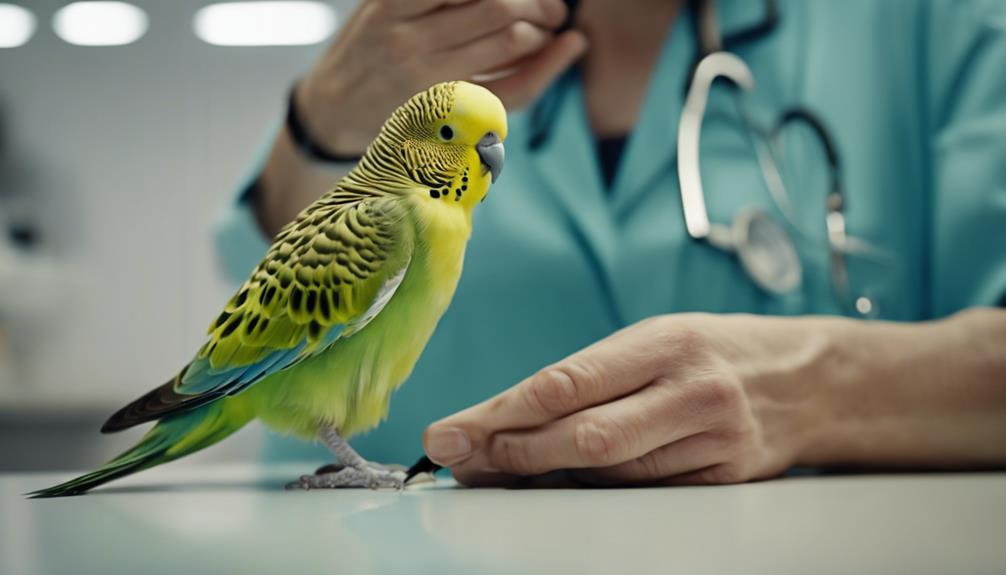
Maintaining a vigilant approach towards budgerigar health is crucial for ensuring their well-being and longevity. Budgerigars, while hardy birds, can still be susceptible to health issues such as respiratory infections, mites, and nutritional deficiencies.
To ensure your budgie stays healthy, consider the following:
- Regular Veterinary Check-Ups: Schedule routine check-ups with an avian vet to monitor your budgie's health, detect any issues early, and provide appropriate care.
- Balanced Diet: Offer a variety of fresh vegetables, fruits, seeds, and pellets to ensure your budgie receives essential nutrients for optimal health.
- Clean Environment: Maintain a hygienic cage by regularly cleaning food and water dishes, perches, and cage lining to prevent potential health problems.
- Behavior Observation: Monitor your budgie's behavior, droppings, feather condition, and overall appearance for any changes that could indicate underlying health issues, allowing for timely intervention if necessary.
Budgerigar Budget and Expenses
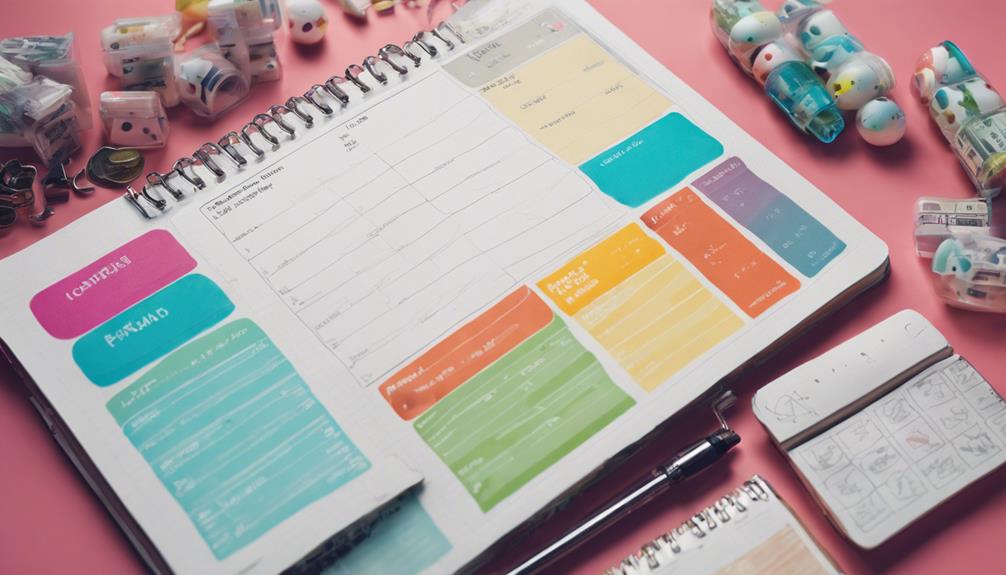
When considering the financial aspects of owning a budgerigar, it is essential to factor in both initial setup costs and ongoing expenses to ensure responsible pet ownership. Budgerigars are generally affordable birds, with initial setup costs ranging from $65 to $185, including a cage, toys, food, and perches. Annual expenses for a budgerigar can total between $80 and $250, covering items like food, toys, treats, and potential vet visits. Additional costs such as grooming supplies and a bird bath should also be considered, adding around $15 to $30 to the annual budget. Planning for unexpected expenses like emergency vet visits or specialized bird care products is crucial when contemplating a budgerigar as a first parrot.
| Expense | Average Cost Range |
|---|---|
| Initial Setup | $65-$185 |
| Annual Expenses | $80-$250 |
| Additional Costs | $15-$30 |
Frequently Asked Questions
Is a Budgie a Good First Bird?
A budgie can be an excellent first bird choice. Their small size, intelligence, and friendly nature make them ideal companions. With proper care, training, interactive toys, and bonding, beginners can enjoy a rewarding experience while avoiding common health issues.
What Is the Best Parrot for a First Time Owner?
For a first-time owner, a budgie offers a delightful mix of vibrant colors, playful demeanor, and easy training. Their social nature and ability to mimic sounds make them an ideal companion. With proper care, they provide long-term companionship.
What Is the Best Age to Get a Budgie?
For optimal bonding, socialization, and training, the best age to get a budgie is around 8 to 12 weeks old. Young budgies are more adaptable, open to interaction, and eager to learn, making them ideal for first-time bird owners.
What Is the Best Starter Parrot?
Budgerigars are the best starter parrots due to their small size, intelligence, and ability to mimic sounds. They thrive with proper socialization, training, a balanced diet, spacious cage setup, and regular health check-ups, making them ideal for beginners.



